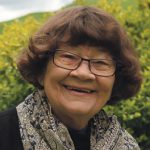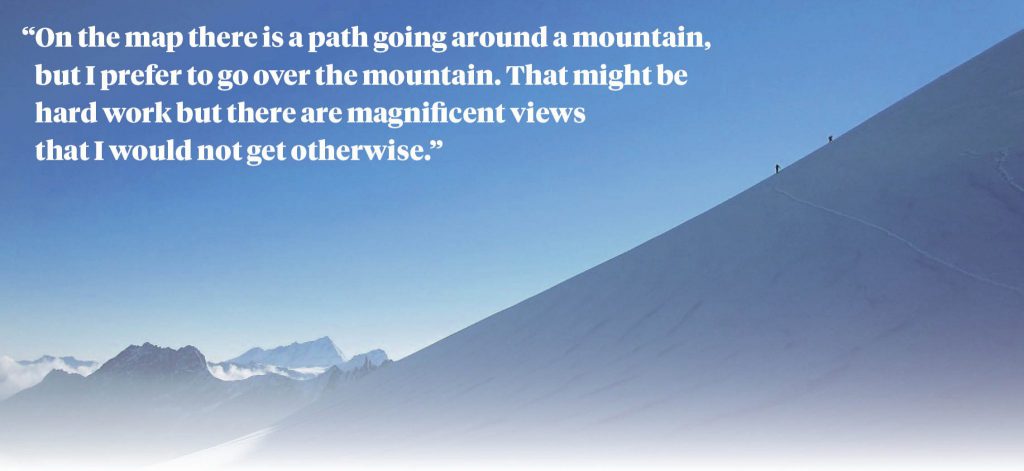WelCom June 2018:
Joy Cowley
My spiritual journey is held and nourished by my Catholic faith; a favourite metaphor being that religion is the map and spirituality is the journey.
When we are young, our religious tradition gives us that map for our faith journey. The map is crisp, new and it carries clear instruction. As we travel, we start making our own notes on this map.
To extend the metaphor, maybe there is an old well that has dried up; but over there I’ve found a spring of fresh water that isn’t on the map.
Perhaps too, I’ve found a shortcut through a rather thorny area. On the map there is a path going around a mountain, but I prefer to go over the mountain. That might be hard work but there are magnificent views that I would not get otherwise. Eventually, I have personal notes written all over my map, and it is now uniquely my own. The important thing is that we do make the map our own as we journey, because we are all different. God works with us in our uniqueness.
It would be error to think that the map is the journey. This is what we could call fundamentalism, when we sit on the road, worshipping the map.
Jesuit retreat director Monty Williams says that theology comes out of life experience. We could call that a self-evident truth. Theology must all come from human understanding of God in our lives. It is in the context of human experience that we unwrap the sacred presence within us, and our awareness changes, deepens, as we get older. There is a parallel here ‒ as our knowledge of ourselves deepens, so does our spiritual awareness.
When we are young, we tend to move about on the surface of life. We are like flies walking on the surface of the stream. In maturity, we realise there is much more going on than we once thought. We realise we are a part of a great system of connections and separation is an illusion. We ask a question. The answer pops up. We have a need. It is met. We experience remarkable coincidence in our lives, to the extent that we want to call it ‘God-incidence’ and all the time we are being called to a larger place. At this stage we also see the deeper truths of our early religious teachings. Awareness of the Sacred comes out of life experience and like life experience, it has many levels of understanding, many layers of meaning.
“We do not make ourselves poor by giving to others.
We make ourselves poor by not giving.
In mature faith, we realise that Jesus’ instructions are not just pious exhortations. In the Gospels he is telling us how the universe actually works. ‘Give and it shall be given unto you.’ That is a natural law. Writer Dr Deepak Chopra says when we give to others, we create a vacuum and more will flow into that space. We do not make ourselves poor by giving to others. We make ourselves poor by not giving.
Likewise, let us consider Jesus’ teachings about dying to self. “He who loves his life will lose it.” “Take up your cross and follow me.” “Except a grain of wheat die it will remain a single grain.”
When we are young, we see these as messages of doom and gloom. But the teachings are not for the young who need to be developing a healthy ego. Jesus is talking about the mature stage off faith where we need to break out of the small prison of self and move into a larger place. This is well described by an anonymous 15th C monk who wrote: ‘Find thyself; tis half the path to God, and then lose thyself and the rest of the way is trod.’
We can all look back on our lives and see times when we were very aware of the Sacred in us and around us. There were special grace-filled moments, some big, some small, when we knew we were held by a loving Presence. Spirituality is not a static state. It’s about movement. We can use the metaphors of growth or journey or talk about unwrapping the truth in our lives. It is a slow but constant process of transformation and it is what we are born for.
The movement is one of love.
The word ‘love’ can be seen as a bit of a cliché even in a religious context, but believe me, it is the stuff of spiritual journey.
We know that immense statement from scripture: God is love and those who live in love, live in God and God lives in them. We may think, oh yes, but this is pious talk. It’s not that simple. Well, actually, it is that simple. If we feel a little cautious about the word ‘love’ because it is so loosely used, but we can think of it as ‘hessed’ the Hebrew word for ‘loving kindness’. Then we come home to it. ‘God is loving kindness and those who live in loving kindness, live in God and God lives in them.’
When we live in loving kindness we move to a larger place. We feel good about ourselves because loving kindness is our true nature. It is our spiritual identity.
“God is love and those who live in love, live in God and God lives in them.

